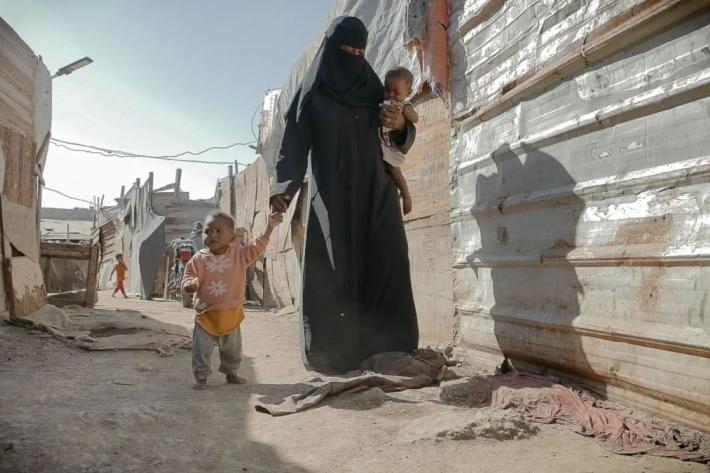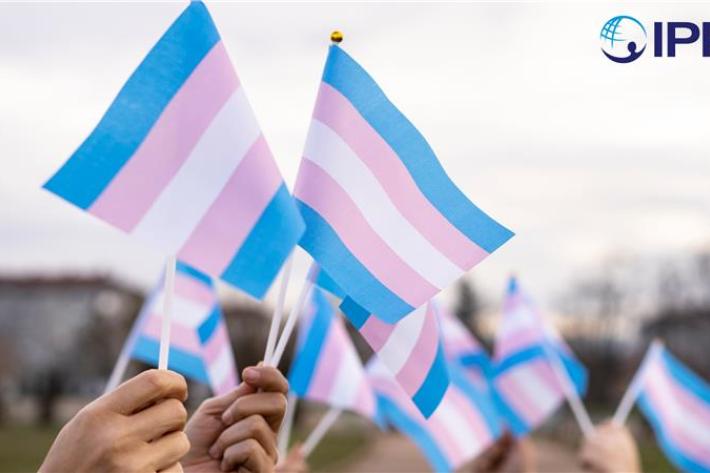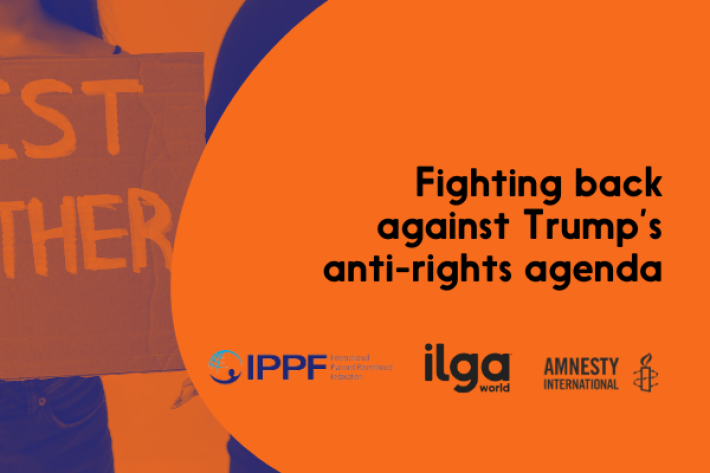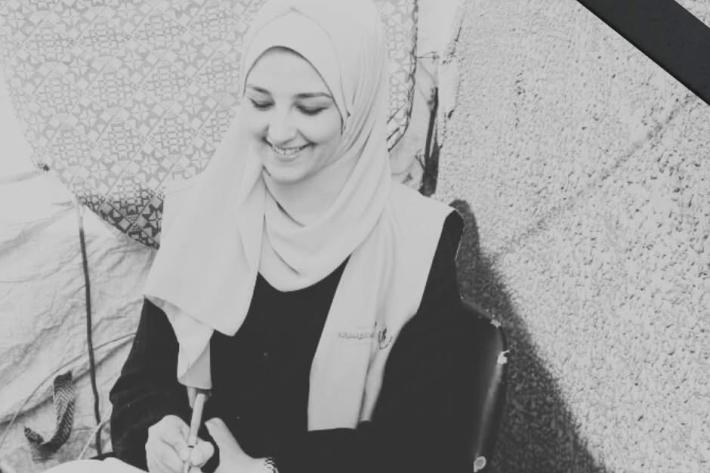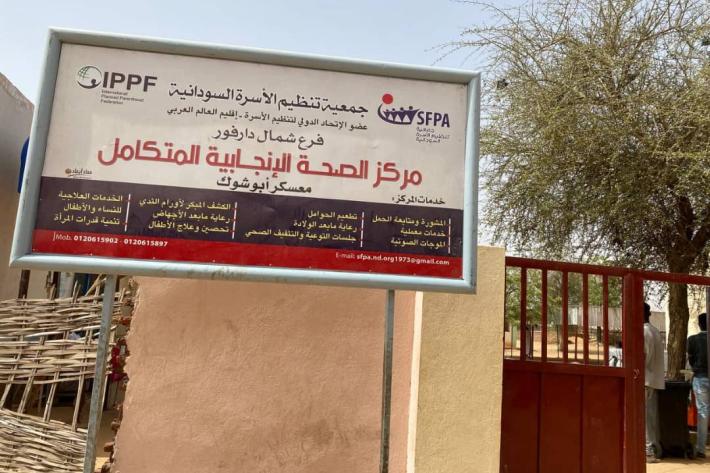
Spotlight
A selection of news from across the Federation

IPPF announces the launch of the call for applications for the post of Director General
The Director-General will play a crucial role in shaping IPPF’s strategic and operational direction, ensuring strong governance, transparency, inclusion, and collaboration.
Filter our news by:

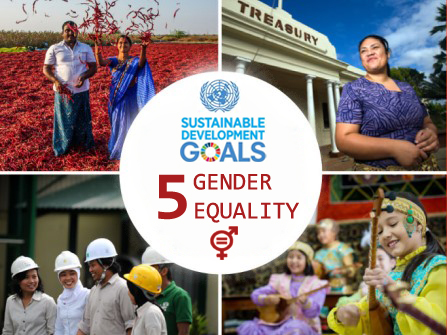
| 15 August 2016
IPPF joins forces to call for gender equality
The International Planned Parenthood Federation (IPPF) has joined forces with Keira Knightley, Annie Lennox and a string of other celebrities and humanitarian organisations to call on the new International Development Secretary to lead the global fight for gender equality. About 40 individuals and charities have written to Priti Patel urging her to show strong leadership, adding that progress towards achieving women’s rights is too slow and under-funded. . The letter says it’s now time ‘to tackle the unacceptable discrimination and injustices women and girls continue to face on a daily basis’. Today @marthalanefox, @lovegwendoline + 38 more ask @patel4witham to invest in #fearless grassroots women’s groups: https://t.co/yDMWmL4YDd — ActionAid UK (@ActionAidUK) 12 August 2016 The issues facing women and girls, it says, range from the gender pay gap to online abuse, sexual violence in conflict, and girls’ lack of access to education - gender inequality continues to be a major barrier and affects women and girls everywhere. Statistics show that one in three women will face violence in their lifetime, nearly two thirds of the world’s illiterate adults are women, and that fewer than four per cent of the world’s leading corporations have female CEOs. We stand with other #womensrights supporters in this letter to @patel4witham https://t.co/7h2RNNl793 #fearless pic.twitter.com/UHlXyih0Qm — Womankind Worldwide (@woman_kind) 12 August 2016 Despite the problems facing women and girls it is an area that misses out on investment. An independent report found recently that funding women's rights organisations is a "neglected" area in Dfid (the Department for International Development) spending. The letter says: “While there is no quick fix for achieving gender equality, we know that challenging social norms and prioritising women’s voice and leadership are vital. There is also broad consensus that one of the linchpins of realising long-term, transformative change for women and girls is a strong, vibrant and sustainable women’s rights movement, which remains chronically under-funded.” The letter calls for Ms Patel to invest further in grassroots organisations that support women around the world. It says: “Across the world, women’s rights organisations are at the forefront of providing services to survivors of gender-based violence; ensuring women and girls’ participation at every level; holding their national governments to account for their policies and practices. Without them it will not be possible to keep the promises of the SDGs (Sustainable Development Goals).” In July Ms Patel publicly committed to keeping the Government's promises to the world’s poor, which was included in the 2015 poverty reduction targets (the SDGs). The signatories of the letter include ActionAid UK, Annie Lennox, Anoushka Shankar,Barbara Broccoli, Care International UK, Caroline Criado-Perez, Christian Aid, Emma Thompson, Felicity Jones, FORWARD, Gwendoline Christie, Imelda Staunton, International Rescue Committee (IRC), Jane Wellesley, Jodie Whittaker, Keira Knightley, Laura Marling, Leith Clark, Livia Firth, Martha Lane Fox, Maryam D’Abo, Naomie Harris, National Alliance of Women’s Organisations (NAWO), Oxfam GB, Paloma Faith, Plan International UK, Progressio, Sarah Waters, Shami Chakrabarti, Stars Foundation, Sophie Walker, Thandie Newton, The Circle, Vanessa Redgrave, WEN Wales, White Ribbon Alliance, Widows for Peace through Democracy (WPD), Womankind Worldwide and Women’s Equality Party. A story about the letter was published in the Daily Telegraph which can be read here: www.telegraph.co.uk/news/2016/08/12/keira-knightley-and-vanessa-redgrave-call-on-priti-patel-to-lead/
| 23 May 2016
Global comprehensive sexuality education: “too little, too late, too biological” says new report
Sex education across the world is ‘too little, too late and too biological’, according to a new report released today by the world’s leading provider of sexual health services. The International Planned Parenthood Federation (IPPF), which works with partner organisations in 170 countries, is calling for all of the world’s 1.8 billion young people aged between 10 and 24 to get universal access to comprehensive sexuality education (CSE). A new report called: ‘Everyone’s Right to Know: delivering comprehensive sexuality education for all young people’ calls for more investment in, and better CSE for the largest youth population that the world has ever seen. IPPF says it is an issue that needs to be tackled urgently as the number of young people continues to rise. “The starting point, and the absolute minimum requirement, is that CSE must reach all young people – wherever they are,” according to the Director General of IPPF, Tewodros Melesse. “We cannot achieve gender transformative change by focusing only on health outcomes. We must equip young people with information about health as well as positive aspects of sex and sexuality,” he added. The report argues that millions of young people are missing out completely on CSE. It says that CSE delivery is often outdated and non-participatory and that teaching staff are not adequately trained and content focuses exclusively on health outcomes, rather than the recognition of rights. Too often CSE is scientifically inaccurate and solely geared to health outcomes. In particular, it emphasizes potential negative health risks, as opposed to seeing young people as sexual beings and recognizing the positive aspects of sexuality. The report also says that the most vulnerable young people, who often find themselves outside the school system, are excluded. IPPF believes gaps must be filled to ensure that CSE is also provided in non-formal settings outside the classroom, reaching the hardest to reach young people. Vesna Turmakovska works with young people with learning difficulties at IPPF’s Member Association in Macedonia. She said: “Sexuality is part of these young people’s lives; they’re sexual beings and they express their sexuality on a daily basis. Some parents were afraid that the very fact of learning about sexuality would encourage their children to have sexual relations. “We explained that it was about giving skills to their children to make them capable of defending themselves from potential abusers. We also explained that they need skills to become more independent in life, and need to be able to make a distinction between friendship and love.” The report demands three things. It calls on government worldwide to deliver high quality CSE that meets the needs of all young people in and out of schools. Secondly, governments, civil society organizations and health providers must make sure teachers, educational institutions and individuals who deliver CSE in both schools and non-formal settings are trained sufficiently and are confident in delivering sexuality education in a way that is positive and non-judgmental. Finally, educators and civil society should work with communities and parents to build support for CSE as well as a culture that supports choice and respect for young people and their sexual and reproductive health and rights. This report says implementing high quality CSE inside and outside schools is a necessity for governments worldwide, not a political choice. It says that to ignore the education of young people, to restrict their choices, to limit access to life-saving services and to deny their happiness Notes to editors: For more information please contact a member of IPPF’s communications team. Marek Pruszewicz, Director of Communications [email protected]+44(0) 7740 631769
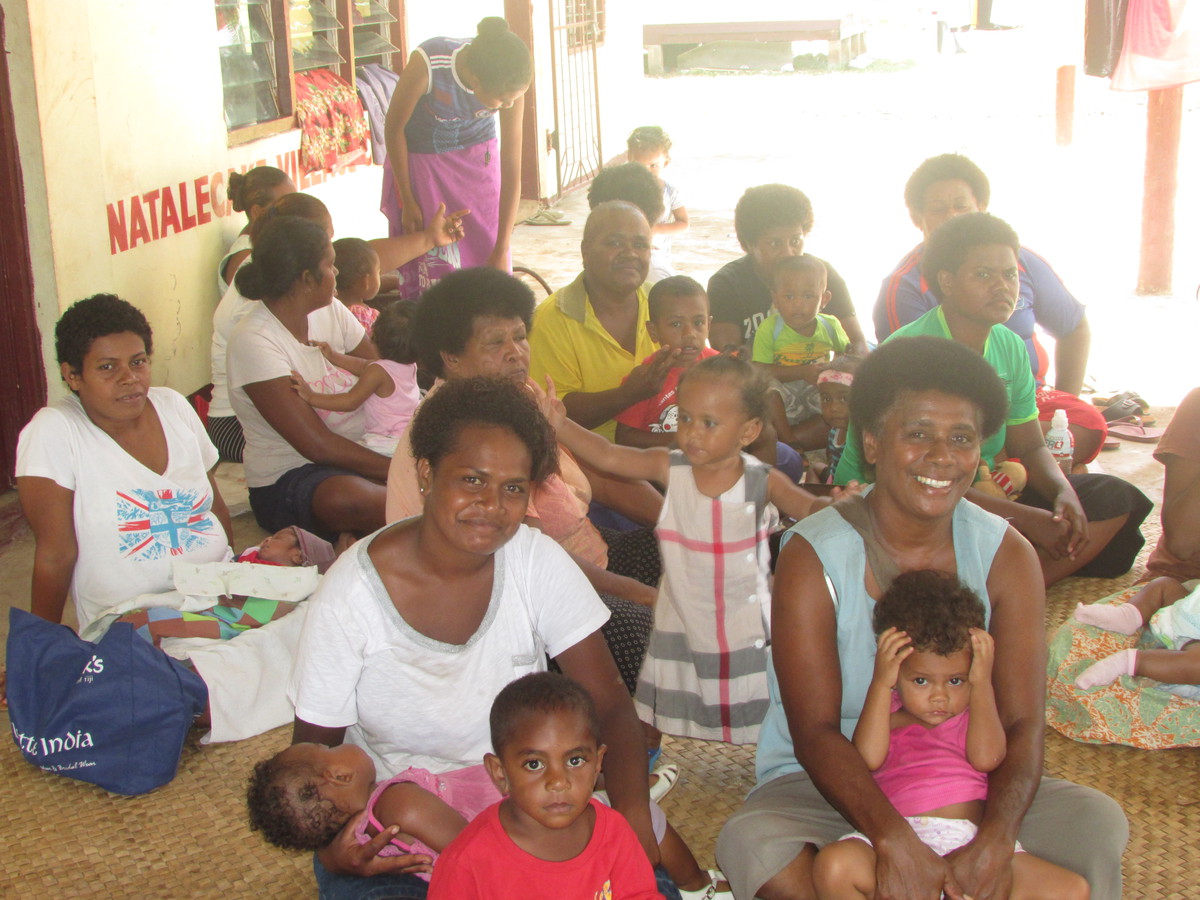
| 22 March 2016
Emergency update from Fiji
One month on from Cyclone Winston, IPPF has helped hundreds of families, including new mothers and pregnant women. Thousands of people are disaplaced and 43 have now been confirmed dead in the worst tropical super-storm to have ever hit the Pacific. IPPF’s humanitarian wing, the SPRINT Initiative, is solely funded by the Australian Government to provide life-saving sexual and reproductive health services following a humanitarian crisis. The Australian Government provided an additional AUD $100,000 to ensure SPRINT could respond to the worst affected populations. IPPF’s assistance includes distributing hygiene and dignity kits to pregnant women and new mothers, providing maternal and neonatal healthcare, providing family planning and prevention programs to reduce the spread of sexually transmitted infections, including HIV. There has been an urgent need to respond to the immediate sexual and reproductive health needs of communities, specifically vulnerable groups such as pregnant and lactating women and women & girls at risk of gender-based violence. In crisis settings rates of gender-based violence drastically increase, and SPRINT has provided survivors with emergency care and services. IPPF-SPRINT has reproductive health missions in the provinces of Nataleira, Natalecake, Vadravadra. The Ministry of Health, under the Fiji Government, has also committed their medical staff to IPPF's medical camps. A key partner to the humanitarian repsonse is IPPF's local member association, the Reproductive and Family Health Association of Fiji (RFHAF). The Australian Minister for Foreign Affairs, the Honourable Julie Bishop paid a visit to IPPF-SPRINT’s SRH mission in early March to observe the work of the Australian-funded response. The Minister also distributed hygiene kits to the affected population in Rakiraki hospital in western Fiji. Apart from providing key sexual reproductive services, IPPF-SPRINT is also providing basic medical assistance to those affected.

| 10 March 2016
IPPF recognized in the GIZ Gender Prize 2016
IPPF has been recognized in the GIZ Gender Prize 2016 competition which promotes gender mainstreaming. Deutsche Gesellschaft für Internationale Zusammenarbeit (GIZ), a leading provider of international cooperation services for sustainable development, holds an annual internal Gender Competition to promote creativity and innovation for gender equality in their sustainable development work. GIZ’s global BACKUP Health programme won first prize for promoting gender equality within programmes funded by the Global Fund to fight AIDS, Tuberculosis and Malaria. The collaborative ‘Shadows and Light’ project with IPPF was highlighted for its gender transformative approach to sexual and reproductive health (SRH) and HIV services for all, including women and girls, men and boys, and anyone perceived to be outside of the norms that constitute what are ‘feminine’ and ‘masculine’, including lesbian, gay, bisexual, transgender and intersex people. Delivered by IPPF Member Associations in Cameroon, Kenya, India and Uganda, the three-year project focused on men who have sex with men, sex workers, people who inject drugs, and transgender people – populations at increased risk of HIV and other STIs – and set out to improve the linked sexual and reproductive health and HIV needs of these key populations. Alan Smith, IPPF’s Senior Advisor, HIV said: “I am very pleased that IPPF is recognised - with our partners GIZ - for this gender award linked to International Women’s Day, in particular for our innovative Shadows and Light project which focusses on the rights of key populations and challenges traditional gender norms.” Other winners included a renewable energies and energy efficiency programme in Mexico and a vocational training and sustainable development initiative in Ghana. Eighty seven teams from 52 countries participated in the competition which covered the fields of governance, economic development and employment, environment, climate change and biodiversity, agriculture and rural development, energy, public finance, education and health.
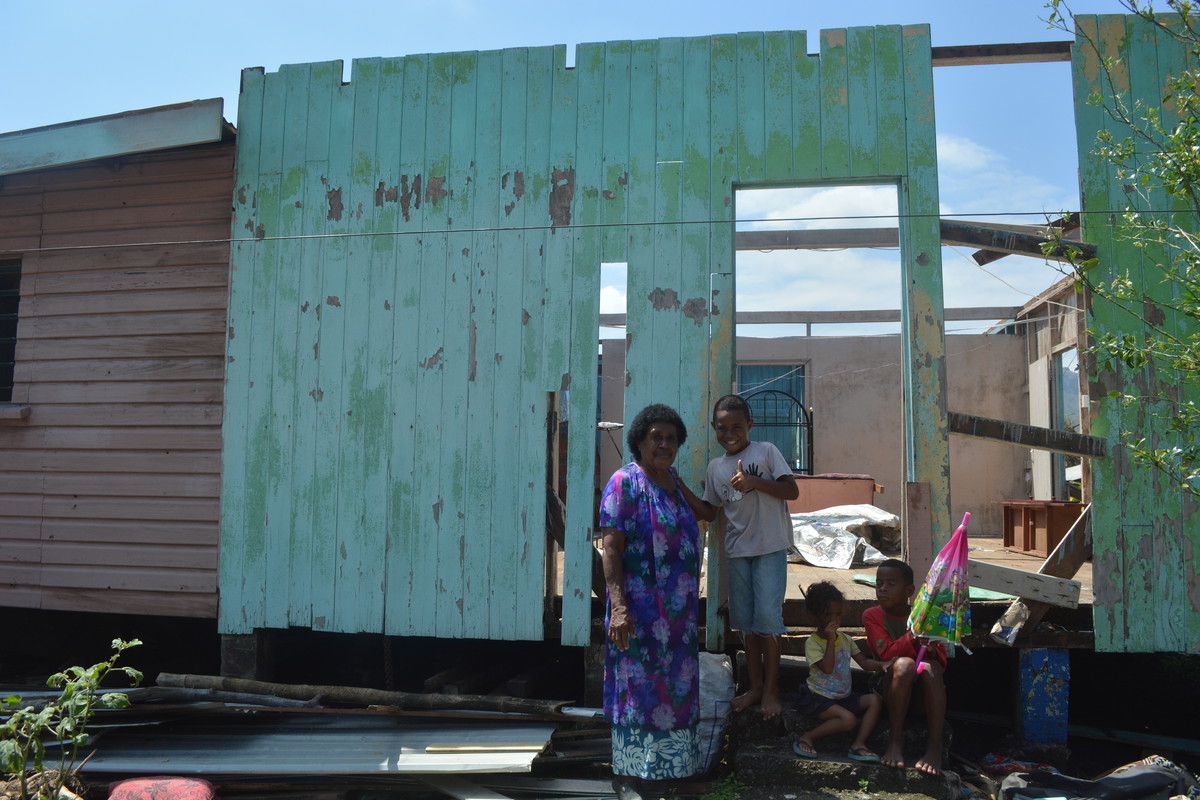
| 26 February 2016
“I have never experienced such a strong cyclone in my 77 years of life.”
“I have never experienced such a strong cyclone in my 77 years of life.” Jokaveti Bavou lives in the village of Drauniivi, in the Fijian province of Ra. It was right in the path of Cyclone Winston, the strongest storm to ever strike the Southern Hemisphere. A week on from the disaster, Jokaveti, her son Jim and her grandchildren are safe. But there is no longer a roof on her house, and precious little left inside. In a village of 910 people, 75 houses were completed destroyed and about 65 damaged. Jokaveti was in her house with her grandchildren when Cyclone Winston arrived. “On Saturday night the winds started to increase. I told Jim that I was not sure of the house; I didn’t believe that it would be able to keep us safe. I told him that if the house started to collapse, we would run to his house for safety.” “The wind was getting stronger and when I looked at the back door, it had blown open. I took a hammer and nail to it. But when I got back to the other room, the main door had blown open and the wind was really strong. Then the wind took the roof off my house.” “I told my granddaughter that everything was terrifying and we needed to go and hide somewhere. It was not safe to be in the house because of the flying debris.” “I got out and my son called out from his house and told us that we should go and hide underneath our house. He tried to come out of his house to save us, but the wind was so strong and roofing iron was flying around.” “I went underneath my house with my grandchildren holding a lamp and stayed there until the wind died. My son’s eyes never left us. Luckily for us a corrugated roofing iron flew and covered where we were hiding. I just cried and continued to thank God for keeping us safe.” “I could sense fear from all of us including my grandchildren. They were crying too. My son kept on calling to check on us until the wind died down.” Miraculously, no-one from Jokaveti’s family or the village was killed or seriously injured. IPPF is establishing centers in the Northern and Western parts of Fiji to provide medical services, especially those that deal with maternal and child health and sexual and reproductive health. It is working closely with the Reproductive and Family Health Association of Fiji (IPPF’s member in Fiji), UNFPA Pacific, Empower Pacific, Fiji’s Ministry of Health and Medical Services. Donate now!

| 28 January 2016
Pledging to reach new contraceptive users: Turning Family Planning into Future Planning for 60 Million Women
The International Planned Parenthood Federation (IPPF) announced its most ambitious pledge ever: to realize the human rights of a further 60 million women to choose freely the size of their families. The pledge was unveiled as IPPF's global contribution to the Family Planning 2020 goal at the International Family Planning Conference in Indonesia today. IPPF is committed to working with Family Planning 2020 and the global family planning community to reach the goal of ensuring 120 million additional women have access to family planning by 2020. The Federation, with the world's largest non-governmental family planning service delivery network, has driven its own performance since the London Summit reaching 15 million new users of modern family planning. IPPF is now upwardly revised its pledged contribution towards the global FP2020 goal. Thank you to @ippf for pledge to serve 60M NEW users of contraception to meet #FP2020 goals! #ICFP — Family Planning 2020 (@FP2020Global) January 28, 2016 Tewodros Melesse, IPPF Director General, announcing the pledge, said “This is not a game of numbers. For us, it's very simple, it can only be about putting women at the front and centre of what we do. I'm delighted by what we have achieved and that we can make this significant and increased contribution through this pledge. Since 2012, IPPF's total reported client numbers increased by nearly 40 per cent. This was achieved by expanding our client base, not by changing who we serve. We have raised investment in family planning and improved our overall performance." Building on this success, IPPF has set an even more ambitious target for new users to contraception. Between 2015 and 2020 IPPF pledges to reach a further 45 million new users in the FP2020 focus countries. This will mean that IPPF will serve a total of 60 million new users between 2012 and 2020, a major contribution towards the FP2020 goal. Dr. Ariel Pablos-Méndez, Assistant Administrator for Global Health and Child and Maternal Survival Coordinator, Global Health Bureau, USAID said on IPPF's announcement,'Community driven approaches increase access for new users to family planning. When offered alongside a basket of primary health services - like those provided by IPPF - poor, young and rural women and men can get the voluntary family planning and other health programs that focus on their needs. This client-focused approach will get us another step closer to our FP 2020 goals and ultimately universal health coverage." “FP2020 congratulates IPPF on this ambitious renewed commitment to advancing the rights of women and girls around the world to decide for themselves when and how many children to have,” said Beth Schlachter, FP2020 Executive Director. “IPPF has been a leader in providing modern contraception to women and girls for decades, and as key partners in the global FP2020 movement they are helping ensure that family planning remains a central part of the global development agenda as we work towards achieving the Sustainable Development Goals and universal access.” IPPF is on target to achieve our goal of doubling the number of services provided by 2015. This is a milestone towards the Federation's commitment to treble the number of its high-impact life-saving and changing sexual and reproductive health services provided by 2020. Between 2012 and 2014, IPPF achieved a significant increase in access for new users of modern contraception. In 59 of the 69 FP2020 focus countries where IPPF is operational, the Federation provided family planning services to 15 million new users in just three years. Our Strategic Framework which started in January 2016, renews and strengthens its commitment to support the rights of women and girls to decide freely whether, when and how many children to have. IPPF will deliver high impact, quality, rights-based, integrated sexual and reproductive health services, including packages that address family planning, safe abortion, prenatal care, STIs/HIV, sexual and gender-based violence and cervical cancer. IPPF will optimize the number of people it can serve by increasing operational effectiveness, expanding provision in humanitarian emergencies and increasing national and global income to provide the increased services. The Federation will also enable the provision of services by other public and private health providers.

| 17 August 2016
Thousands sign up to support sexual health
A 410,000–strong petition has been handed to the United Nations calling for women and girls to be put at the heart of the world’s next poverty reduction targets. The I Decide petition, which was started by the International Planned Parenthood Federation, aimed to ensure that sexual and reproductive health and rights were a central focus of the Sustainable Development Goals being decided this month (SDGs). People from 151 countries around the world signed the petition which has been handed to the United Nations Secretary General, Ban Ki-Moon. In a letter to Mr Ban, the Director-General of IPPF Tewodros Melesse, said: “IPPF has gathered the hopes of women, men and young people -gathered from around the world – who have called for the ability to decide on their own futures, including what happens to their bodies, who they share their life with and the size of their families. “They expressed their support for sexual and reproductive health and rights to be at the heart of the new development framework and we are grateful for your support in ensuring this is the case,” he added.









